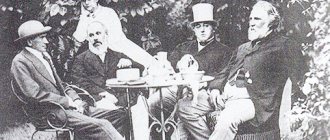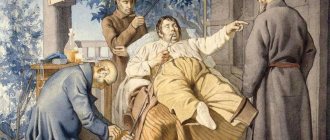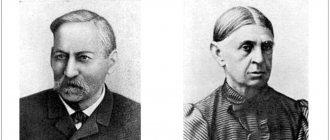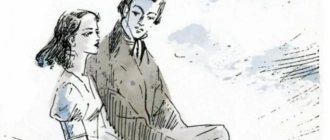November 9, 1818 – September 3, 1883 (64 years old)
4.5
Average rating: 4.5
Total ratings received: 11480.
Ivan Sergeevich Turgenev (1818–1883) - famous Russian writer and poet, publicist and playwright, classic of Russian literature of the 19th century. Turgenev's work includes six novels, many short stories, novellas, articles, plays and poems. Among his most famous works are Mumu and Fathers and Sons.
The material was prepared jointly with a teacher of the highest category, Kuchmina Nadezhda Vladimirovna.
Experience as a teacher of Russian language and literature - 27 years.
early years
Ivan Sergeevich Turgenev was born on October 28 (November 9), 1818 in the city of Orel. His family, both on his mother’s and father’s sides, belonged to the noble class.
Turgenev received his first education at the Spasskoye-Lutovinovo estate. The boy was taught literacy by German and French teachers. Since 1827, the family moved to Moscow. Turgenev then studied in private boarding schools in Moscow, and then at Moscow University. Without graduating, Turgenev transferred to the Faculty of Philosophy of St. Petersburg University. He also studied abroad and then traveled around Europe.
Autobiography
AUTOBIOGRAPHYIvan Sergeevich Turgenev was born on October 28 (November 9) <1818> in the city of Orel from Sergei Nikolaevich Turgenev and Varvara Petrovna Lutovinova - the second of three sons; the eldest of them, Nikolai, is still alive, the youngest, Sergei, died at the age of 16. Ivan Sergeevich's father served in the Elisavetgrad cuirassier regiment, stationed in Orel. Having retired with the rank of colonel, he settled on his wife’s estate, the village of Spassky-Lutovinovo, located ten miles from the city of Mtsensk, Oryol province, and in 1822 he made a trip abroad with his whole family and servants - in two carriages and a van. , during which I.S. almost died - in the Swiss city of Bern, falling from the railings surrounding the pit in which the city bears were kept; his father barely managed to grab his leg. Returning to the [village] of Spasskoye, the Turgenev family lived a village life, that noble, slow, spacious and small life, the very memory of which has almost been erased in the present generation - with the usual environment of tutors and teachers, Swiss and Germans, home-grown uncles and serfs nannies. At the beginning of 1827, the Turgenevs moved to Moscow, where they bought a house on Samotek, and in 1833, I. S., being only 15 years old, entered Moscow University, in the “literature” department, as it was called at that time . Of his former teachers, I. S. remembers with gratitude D. N. Dubensky, a teacher of the Russian language, P. N. Pogorelsky, a teacher of mathematics, and I. P. Klyushnikov, a fairly famous writer of that time, who signed his poems with the letter Θ . I.S. did not stay at Moscow University for long, only a year; I listened to professors Pogodin, Pavlov, a follower of Schelling’s philosophy, who read physics on it, and next to him, the old man Pobedonostsev, who held the students through Lomonosov’s laudatory speeches and asked them “khria.” — In 1834, Ivan Sergeevich’s father transferred him to St. Petersburg University to live together with his older brother, who entered the Guards Artillery, and died the same year. I.S. graduated from the university in 1837 as a candidate, and in 1838 he went to complete his studies in Berlin on the steamship Nicholas I, which burned down in sight of Travemünde. The stock of information he took away from St. Petersburg University was not great: of all his professors, only P. A. Pletnev knew how to influence his listeners. In Berlin, I. S. was mainly engaged in Hegelian philosophy (with Werder), philology and history. At that time, the University of Berlin could boast of the names of Böck, Zumpt, Ranke, Ritter, Hans and many others. Dr. I.S. spent two semesters in Berlin; Granovsky and Stankevich took courses with him. In 1840, after a short stay in Russia and a trip to Italy, he returned to Berlin again and remained there for about another year, living in the same apartment with the famous M. A. Bakunin, who was not involved in politics at that time. In 1841, he returned to Russia, entered the office of the Minister of Internal Affairs under the command of V.I. Dahl in 1842, served very poorly and defectively, and retired in 1843. In the same year, he entered the literary field - he published a short poem “Parasha”, without, however, publishing his name, and met Belinsky. Over the next two years, he continued to write poetry and even short poems, which did not meet or deserve approval, and when he left abroad at the end of 1846, he decided to completely stop or change his activities; but the success of a short passage in prose entitled “Khor and Kalinich” and left by him to the editors of the newly relaunched Sovremennik magazine returned him to literary pursuits. Since then they have not stopped - and last year the fifth edition of his collected works appeared. A minor break in these studies occurred only in 1852, when, regarding the publication of his article on the death of Gogol, or, more precisely, as a result of the appearance of a separate edition of “Notes of a Hunter,” I. S. was imprisoned for a month in a police house, and then sent to live in the village, from which he returned only in 1854. Since 1861, I.S. lives mostly abroad.
Notes
Printed with a white autograph - IRLI,
f. 293, op. 1, no. 1751.
First published (based on white autograph with editorial amendments by M. M. Stasyulevich): Russian Library, vol. 6. I. S. Turgenev. St. Petersburg, 1876, p. IX-XVI.
Included in the collected works for the first time in the publication: T, Works,
vol. 12, p. 5-6.
Draft autograph – Bibl Nat,
Slave 86: description -
Mazon,
p.
83; photocopy - IRLI,
R. I, op. 29, no. 249.
This autobiography, as is known, was preceded by the youthful “Sketch of an Autobiography” 1, written by Turgenev under the influence of reading “Confession” by J. -J. Rousseau (see: present edition, vol. 1, p. 401).
- early June 1875, Stasyulevich, with the consent of Turgenev, signed a contract with the publisher of his works F.I. Salaev for the release of the sixth volume of the “Russian Library”, dedicated to Turgenev. He approached the writer with a request to write an autobiography for this volume. In a letter dated July 13 (25), 1875, Turgenev promised Stasyulevich to write an “autobiographical sketch” by August 1 AD. Art., but handed it over only at the beginning of September 1875 (see letter dated September 2 (14), 1875).
The autobiography written by Turgenev for Stasyulevich was the most complete set of biographical information about the writer. In comparison with the text of the essay from “Niva” (1872, No. 9), corrected by Turgenev’s hand, sent to P.N. Polevoy, this autobiography was replenished with a number of details (about the nature of noble landowner life in Spassky, about teachers at Moscow and St. Petersburg universities, about classes at the University of Berlin and its celebrities, about service under the command of V. I. Dahl). As evidenced by the initial versions of the draft and white manuscripts, Turgenev, sketching out his autobiography, clarified the geographical names of the places of his stay, the dates of the main events of his life, as well as the characteristics of the professors of Moscow and St. Petersburg universities M. G. Pavlov, P. V. Pobedonostsev, P. A. Pletnev and his teacher I.P. Klyushnikov. Describing his studies in Berlin, Turgenev in a draft autograph named his comrades at the University of Berlin, close to the circle of Stankevich, Ya. M. Neverov and N. G. Frolov.
In Stasyulevich’s white autograph, in some places the text was slightly shortened, in others, on the contrary, he added phrases introducing quoted passages from “Literary and Everyday Memoirs.”
In the Russian Library, the autobiography was published taking into account Stasyulevich’s corrections. The words: “living in the same apartment with the famous M.A. Bakunin, who was not involved in politics at that time,” were omitted, apparently for censorship reasons 2.
Page 203. ... from Sergei Nikolaevich Turgenev and Varvara Petrovna Lutovinova
~
at that time.
- See present. volume, p. 476 (note to the essay “Ivan Sergeevich Turgenev”).
From their former teachers
~
remembers with gratitude D.N. Dubensky
~
P.N. Pogorelsky
~
and I.P. Klyushnikov
~
with the letter Ө.
— About Dmitry Nikitich Dubensky (died in 1863), Platon Nikolaevich Pogorelsky (years of life unknown), Ivan Petrovich Klyushnikov, see:
T, PSS and P, Letters
, vol. I, p. 665, 669, 682.
Page 203-204. ...listened to professors
~
Pavlov
~
old man Pobedonostsev
~
“khria”.
- Mikhail Grigorievich Pavlov (1793-1840) - professor of physics, mineralogy and agriculture at Moscow University (since 1820).
He had broad literary interests (see: Herzen
, vol. 8, pp. 122, 502). Pyotr Vasilyevich Pobedonostsev (1771-1843) - professor of Russian literature at Moscow University, whose lectures were distinguished by conservatism, vacuity and monotony.
Page 204. ~ Ranke, Ritter, Hans and many others. etc.
- Ranke Leopold (1795-1886) - German historian;
Ritter Karl (1779-1859) - German geographer, member of the Berlin Academy of Sciences (since 1820); Hans Eduard (1797–1839) was a German philosopher, historian and lawyer. All three are professors at the University of Berlin (see: T, PSS and P, Letters,
vol. 1, pp. 173, 524, 683; vol. IX, pp. 193, 616, 635, 636).
… ~ P. A. Pletnev
~
act on the listeners.
- See present. volume, p. 11 (“Literary evening at P. A. Pletnev” and notes to it).
…with him
~ . — See also present. volume, p. 8 (“Instead of an introduction”).
…and last year the fifth edition appeared
~
essays
. — Works by I. S. Turgenev. Parts I-VIII. Ed. br. Salaev. M., 1874.
1 Gubareva, a friend and then companion of V.P. Turgeneva, who later found herself in the position of a hanger-on. She and her brother Voin Ivanovich Gubarev (see about him this present volume, p. 432) were closely acquainted with the writer’s mother, apparently from the time the Lutovinovs stayed in the Krom estate of Kholodovo (the Gubarevs then lived in Kromy). See: Chernov N. A chapter from childhood. Unknown pages of the biography of I. S. Turgenev. - Literary newspaper, 1970, No. 29, July 15; Kolontaeva V. Memories of the village of Spassky. - IV,
1885, No. 10, p. 49.
2 In addition to the two well-known autobiographies of Turgenev, published in 1874 by P. N. Polev and in 1876 by M. M. Stasyulevich, it is also necessary to take into account a number of biographical notes about Turgenev that appeared abroad and at home during the writer’s lifetime and in one or another to a different degree authorized by him (see: Bityugova I. A. To the autobiography of Turgenev. - T sb,
—391).
Creativity flourishes
Since 1847, at the invitation of Nekrasov, his “Modern Notes” and the first chapters of “Notes of a Hunter” (“Khor and Kalinich”) have been published in the transformed journal “Sovremennik”, which brought the author enormous success; and he began work on the rest of the hunting stories.
Work at Sovremennik brought Turgenev many interesting acquaintances; Dostoevsky, Goncharov, Ostrovsky, Fet and other famous writers were also published in the magazine.
In 1847, together with his friend Belinsky, he went abroad, where he witnessed the February revolution in France.
In the late 40s - early 50s, he was actively involved in drama, writing plays “Where it is thin, there it breaks” and “Freeloader” (both – 1848), “Bachelor” (1849), “A Month in the Country” (1850) , “Provincial Girl” (1851), which were staged on theater stages and were a success with the public.
Turgenev translated the works of Byron and Shakespeare into Russian, from them he learned the mastery of literary techniques.
In August 1852, one of Turgenev’s most important books, “Notes of a Hunter,” was published.
After Gogol’s death, Turgenev wrote an obituary, for which Ivan Sergeevich was sent into exile in his native village for two years. There is an opinion that the true reason for the exile was the radical views of the writer, as well as the sympathetic attitude towards the serfs, which he expressed in his work.
During his exile, Turgenev wrote the story “Mumu” (1852). Then, after the death of Nicholas I, Turgenev’s most famous works appeared in print: “Rudin” (1856), “The Noble Nest” (1859), “On the Eve” (1860) and “Fathers and Sons” (1862).
Other famous works of the writer include the novels “Smoke” (1867) and “Nov” (1877), novels and short stories “The Diary of an Extra Man” (1849), “Bezhin Meadow” (1851), “Asya” (1858), “ Spring Waters" (1872) and many others.
In the fall of 1855, Turgenev met Leo Tolstoy, who soon published the story “Cutting the Forest” with a dedication to I. S. Turgenev.
“Mumu” - love for the people and hatred of serfdom
Turgenev openly opposes serfdom, because of this he has conflicts with the authorities, he is exiled to the village. At this time, he wrote many stories and novellas, published in Sovremennik, in particular, “Mumu”.
The main character of this story, the serf Gerasim, simultaneously embodies in his image both Turgenev’s hatred of serfdom and his love for the common Russian people. Gerasim wants to have a living creature nearby who would understand and love him (after all, he is mute), so he gets a dog.
However, the barking lady prevents her from sleeping, and Gerasim is forced to obey her will and remove Mumu. He decides to drown her. This act reflects the spiritual strength of Gerasim, although he feels sorry for the dog, he is obliged to follow the order of the lady, because he is a serf, and this is his duty.
Last years
In 1863 he left for Germany, where he met outstanding writers of Western Europe and promoted Russian literature. He works as an editor and consultant, himself translating from Russian into German and French and vice versa. He becomes the most popular and read Russian writer in Europe. And in 1879 he received an honorary doctorate from Oxford University.
It was thanks to the efforts of Ivan Sergeevich Turgenev that the best works of Pushkin, Gogol, Lermontov, Dostoevsky, and Tolstoy were translated.
In the biography of Ivan Turgenev, it is worth briefly noting that in the late 1870s and early 1880s his popularity quickly increased, both at home and abroad. And critics began to rank him among the best writers of the century.
Since 1882, the writer began to be overcome by illnesses: gout, angina pectoris, neuralgia. As a result of a painful illness (sarcoma), he died on August 22 (September 3), 1883 in Bougival (a suburb of Paris). His body was brought to St. Petersburg and buried at the Volkovsky cemetery.
Personal life
Turgenev experienced the tragedy of love early on. As a teenager, he fell in love with Princess Shakhovskaya, who was four years older than him. However, the girl reciprocated the writer’s father, which broke the heart of young Turgenev.
The next hobby occurred in 1841. The author fell in love with the seamstress Avdotya, but their romance did not end as the writer dreamed. The girl became pregnant from him, but the mother did not allow her son to marry the poor woman. Dunyasha was sent to her parents, and a groom was immediately found for her. Turgenev recognized his daughter only in 1857.
After this, the writer becomes spiritually close to the radical Bakunin’s sister, Tatyana. They establish close communication; they often discuss philosophical topics in their letters. The girl falls in love with the writer, but Turgenev did not have serious feelings for her. Tatyana became the prototype of one of the heroines of the novel “Smoke”.
Many of the writer’s travels abroad were explained by his affair with a married lady, actress and singer Polina Viardot. Turgenev lived with this family “on the edge of someone else’s nest,” and together with his beloved he raised his illegitimate daughter. Because of Viardot, the author had financial problems for three years - his mother refused to send him money. She couldn't accept this girl. The writer maintained contact with this family for thirty-eight years.
Even at 61 years old, the writer never ceases to experience the wonderful feeling of love. Another actress, Marina Savina, who at that time was only twenty-five years old, becomes his new hobby. Despite rare meetings, they maintained correspondence for four years, but the marriage never took place.
Interesting Facts
- In his youth, Turgenev was frivolous and spent a lot of his parents' money on entertainment. For this, his mother once taught him a lesson, sending him bricks in a parcel instead of money.
- The writer’s personal life was not very successful. He had many affairs, but none of them ended in marriage. The greatest love in his life was the opera singer Pauline Viardot. For 38 years, Turgenev knew her and her husband Louis. He traveled all over the world for their family, living with them in different countries. Louis Viardot and Ivan Turgenev died in the same year.
- Turgenev was a clean man and dressed neatly. The writer loved to work in cleanliness and order - without this he never began to create.
All the interesting facts from the life of Turgenev
We have prepared an interesting quest about the life of Ivan Sergeevich
Pass the
Tatar trace
The Turgenev family comes from the Tatar Murza - Arslan Turgen . He came to Russia in the 15th century to enter the service of Tsar Vasily the Dark. He was baptized and given the name Ivan Turgenev. Arslan's descendants also held important positions in the military service of the Russian Tsars.
This is Peter Turgenev, who was sent to the Kazan Khan on a diplomatic mission, a commander in Astrakhan and a governor in Rylsk in the 16th century. Ivan Vasilyevich Turgenev was a nurseryman at the court of Ivan the Terrible (1556), Vladimir and Stepan (1573) were guardsmen. Dmitry was commander in Kargopol (1589). Also in this council were opponents of the impostor - False Dmitry I; he executed the governor Peter Turgenev in 1606. Other ancestors of the writer were also governors. Denis Turgenev held a post in Torzhok until 1638 and Tambov until 1643.
There are ancestors who ruled in Orel, Serpeisk, Murom, Saratov, Rylsk, Tula, Tyumen, Belgorod in the 17th-18th centuries. Tsaritsyn voivode Timofey Turgenev (before 1670) was killed by Stepan Razin. Other ancestors who held military posts - governors, brigadiers, generals - were often executed by the Pugachevites, supporters of other rebels and conspirators while performing their duties.
When entering memorable information into the Velvet Book of the noble families of Russia, two notes were placed on the Turgenev family - about the birth of Matvey (03/15/1686) and Mikhail (01/24/1687). Subsequently, four clans developed under this surname, their origins were different. There are other Turgenevs, descendants of people from the Golden Horde. The family of Ivan Turgenev, descended from Arslan Turgen, was included in the genealogical book of the Tula province. Only the writer’s family is included in the main Armorial Book of Russia.
Ivan Turgenev is a real Russian writer, since his ancestors were Russian for several centuries. But the family still has Tatar blood at its core, which is often found among the nobles of Russia, as a consequence of two centuries of contacts with the Horde.



